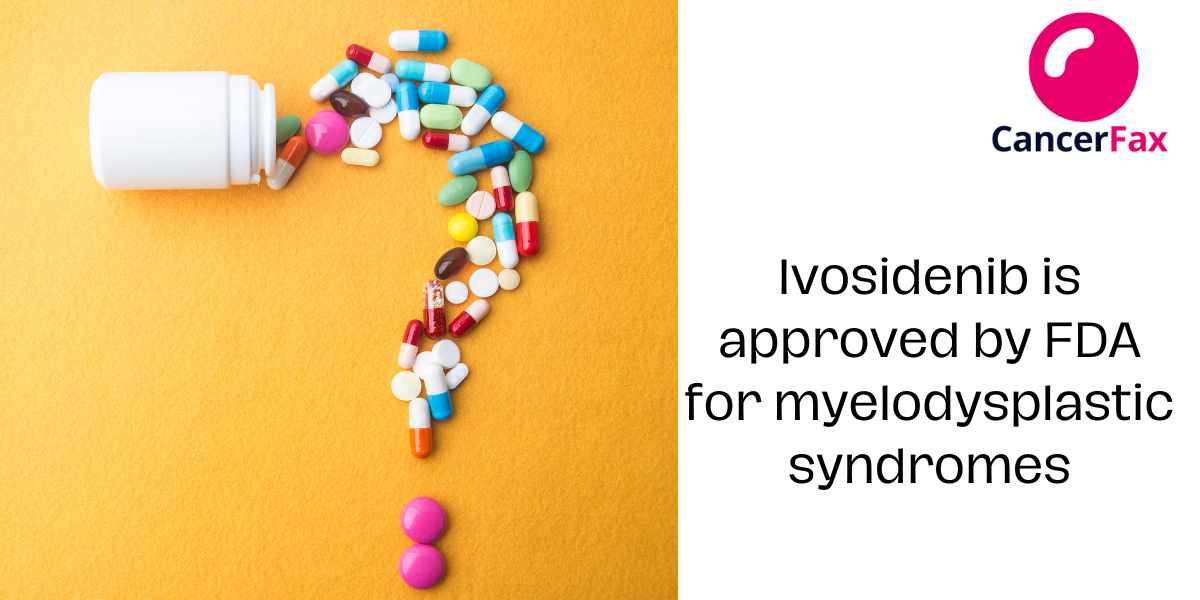Ivosidenib is approved by FDA for myelodysplastic syndromes
Nov 2023: The Food and Drug Administration (FDA) approved Ivosidenib (Tibsovo, Servier Pharmaceuticals LLC) in November 2023 for the treatment of adult patients with relapsed or refractory myelodysplastic syndromes (MDS) who have a susceptible isocitrate dehydrogenase-1 (IDH1) mutation according to an FDA-approved test.
The FDA also approved the Abbott RealTime IDH1 Assay as a companion diagnostic tool for choosing patients to receive ivosidenib.
Approval was based on AG120-C-001 (NCT02074839), a single-arm, open-label, multicenter trial with 18 adult patients who had relapsed or refractory MDS and an IDH1 mutation. IDH1 mutations were identified through the utilisation of local or central diagnostic tests in peripheral blood or bone marrow, and subsequently validated through retrospective analysis employing the Abbott RealTime IDH1 Assay.
Oral inosidenib was administered at a starting dose of 500 mg per day in a continuous fashion for 28 days, or until hematopoietic stem cell transplantation, disease progression, or unacceptable toxicity occurred. The mean duration of treatment was 9.3 months. After receiving ivosidenib, a stem cell transplant was performed on one patient.
The rate of going from needing blood transfusions to not needing them, the rate of complete remission (CR) or partial remission (PR) (2006 International Working Group response for MDS), and the lengths of CR+PR were used to judge how well the treatment worked. Each observed response constituted a CR. 389.9% was the CR rate (95% CI: 17.3, 64.3%). The median time-to-CR was 1.9 months, with a range of 1.0 to 5.6 months. However, the median duration of CR could not be estimated, spanning from 1.9 to 80.8+ months. Out of the nine patients who were initially reliant on red blood cell (RBC) and platelet transfusions, six (67%) achieved independence from RBC and platelet transfusions within any 56-day period following baseline. Seven out of nine patients who were transfusion-free at baseline, including platelet and RBC transfusions, remained transfusion-free for any 56-day period after the baseline period (78 percent).
Comparable to the most frequent adverse reactions observed with ivosidenib monotherapy for AML, these were the most frequent adverse reactions. In addition to gastrointestinal (constipation, nausea, arthralgia, lethargy, cough, and myalgia), these symptoms also include rash and arthralgia. The QTc may also be prolonged by Tibsovo.
A Boxed Warning is included in the prescribing information to warn patients and health care professionals about the potentially fatal differentiation syndrome risk.
View full prescribing information for Tibsovo.
Dr. Nishant Mittal is a highly accomplished researcher with over 13 years of experience in the fields of cardiovascular biology and cancer research. His career is marked by significant contributions to stem cell biology, developmental biology, and innovative research techniques.
Research Highlights
Dr. Mittal's research has focused on several key areas:
1) Cardiovascular Development and Regeneration: He studied coronary vessel development and regeneration using zebrafish models1.
2) Cancer Biology: At Dartmouth College, he developed zebrafish models for studying tumor heterogeneity and clonal evolution in pancreatic cancer.
3) Developmental Biology: His doctoral work at Keio University involved identifying and characterizing medaka fish mutants with cardiovascular defects.
4) Stem Cell Research: He investigated the effects of folic acid on mouse embryonic stem cells and worked on cryopreservation techniques for hematopoietic stem cells.
Publications and Presentations
Dr. Mittal has authored several peer-reviewed publications in reputable journals such as Scientific Reports, Cardiovascular Research, and Disease Models & Mechanisms1. He has also presented his research at numerous international conferences, including the Stanford-Weill Cornell Cardiovascular Research Symposium and the Weinstein Cardiovascular Development Conference.
In summary, Dr. Nishant Mittal is a dedicated and accomplished researcher with a strong track record in cardiovascular and cancer biology, demonstrating expertise in various model systems and a commitment to advancing scientific knowledge through innovative research approaches.
- Comments Closed
- November 24th, 2023






AML/MDS overlap treatment, IDH1 inhibitor therapy, ivosidenib FDA approval, ivosidenib for MDS, MDS targeted therapy, Myelodysplastic syndromes treatment, myeloid malignancy breakthrough, oral chemotherapy alternatives
CancerFax is the most trusted online platform dedicated to connecting individuals facing advanced-stage cancer with groundbreaking cell therapies.
Send your medical reports and get a free analysis.
🌟 Join us in the fight against cancer! 🌟
Привет,
CancerFax — это самая надежная онлайн-платформа, призванная предоставить людям, столкнувшимся с раком на поздних стадиях, доступ к революционным клеточным методам лечения.
Отправьте свои медицинские заключения и получите бесплатный анализ.
🌟 Присоединяйтесь к нам в борьбе с раком! 🌟